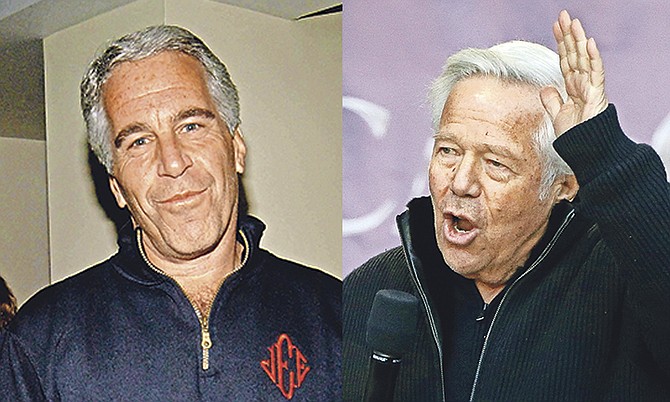Politics and sex are at the heart of two recent Florida scandals. Left, Jeffrey Epstein and, right, Robert Kraft.
With Charlie Harper
Florida: The Sunshine State. Now widely estimated to be the third most populous state in America, right behind California and Texas and, pending the results of the 2020 census, formally overtaking New York. The Bahamas’ favourite shopping centre. Home to a city (Miami) often called the most important city in South America. Winter playground for northeast American millionaires and common folk who can afford it. For lots of Canadians, too. And because of its diversity and rising population, Florida is seen as the pivotal state in American presidential politics: It’s become really difficult to capture the White House without taking Florida. The title of national bellwether used to belong to Ohio, but not anymore. It’s Florida.
Politics and sex are at the heart of two recent Florida scandals. Both touch on issues that seem to be rising not only in America but in many of the world’s democracies in this age of blurred ethical and legal lines and ever starker distinctions between the very rich and everyone else. We’re not going to the barricades here, but just pausing for a moment of reflection on what these two Florida cases might mean for the administration of justice in the US.
The more recent scandal is likely quite familiar by now. It involves Robert Kraft, the billionaire owner of the mighty New England Patriots, winners of 16 NFL division championships and six Super Bowls since 2001 under the leadership of coach Bill Belichick and quarterback Tom Brady. Kraft is known to be pretty friendly with US President Trump. Brady, reputedly Republican-leaning politically, may actually be someone Trump envies a little bit. None of that is likely related to the fact Kraft was caught up in a federal and local law enforcement counter human trafficking operation that snagged several South Florida massage parlours and health spas that may have also served as brothels. Kraft was allegedly revealed on tape accepting the services of a prostitute. But will his social and political connections influence how the Kraft case is legally disposed?
Jeffrey Epstein is not a highly visible sports team owner. He is a hedge fund multimillionaire who lives in Palm Beach and was investigated by local law enforcement and ultimately the FBI for running a sex trafficking ring of mostly underage girls for his and his friends’ pleasure. Some of those friends reportedly included Bill Clinton and Donald Trump. Another influential acquaintance may turn out to be Alex Acosta, who was serving as the top federal law enforcement officer in South Florida when Trump nominated him as Secretary of Labour. Acosta seems to have been effective and successful as US Attorney for the Southern District of Florida. He went after money laundering banks, drug cartels and corrupt local officials, securing convictions in many high-profile cases, starting in 2005.
But during 2007-08, Acosta approved what is called a federal non-prosecution agreement on Epstein. Under its terms, Epstein was granted immunity from all related federal charges. He served 13 months in a private wing at the Palm Beach County jail, with work release from jail for up to 12 hours a day, six days a week. He was also permitted to travel to New York and the U.S. Virgin Islands on his private jet. This is not exactly the same as serving 13 months at Fox Hill Prison.
Last November, a dogged Miami Herald reporter prized the lid off this dust-gathering Pandora’s Box and reported the stories of many of Epstein’s alleged victims. The resulting controversy ended the reported possibility of Acosta replacing Jeff Sessions as Attorney General. But while liberals and other Trump foes are attempting to fan the embers of public outrage back to a full blaze, Epstein and Acosta continue with their lives. As Secretary of Labour, Acosta retains his key role in combatting sex trafficking.
Meanwhile, Kraft’s attorneys are launching a legal blitz aimed at keeping out of sight as much as possible of his tawdry alleged activity. There is open speculation that they are hoping to delay any release of videotaped or other evidence that might further sully Kraft’s reputation or by extension, that of the NFL where he remains a very influential owner. The delay, it is hoped, will last until the public tires of the issue.
While these cases certainly appear to differ by orders of magnitude, they do have some elements in common. It will be worth watching what further public shaming or legal jeopardy Epstein, Acosta or Kraft may suffer. If their penalties are moderate or even trivial, will it be due to political connections?
Cuban shutout likely to be the next play
Hanley Ramirez, who once starred for the Florida Marlins, and Carlos Santana are now two Cleveland Indians teammates who were born in the Dominican Republic and were granted American citizenship recently. That’s not too unusual for foreign-born baseball stars, many of them from the Caribbean, who enter the US on work permits and often have long and successful careers.
That course may not be possible for Cuban baseball stars anymore, however. As part of a general toughening in approach toward the Cuban regime, the US administration has just terminated an Obama-era agreement whereby Cuban baseball stars could enter the US legally on work permits to play professional baseball.
That agreement resembled the pact between Major League Baseball and the top Japanese leagues under which just-retired surefire Hall of Famer Ichiro Suzuki, pictured right, entered the US and broke all sorts of records for the Seattle Mariners.
While on baseball, Seattle and Tampa Bay have raced to unexpected early leads in their divisions. While the Rays are a good team that won 90 games last year and just missed the playoffs, Seattle dumped several of its biggest stars in the offseason and faced a dismal forecast. But starting with two wins over Oakland in regular season games played in Japan, the Mariners have swept aside defending World Series champion Boston and own the most wins in MLB.
Sporting contrasts
The recently-completed US men’s and women’s collegiate basketball championships offered some real contrasts. On the men’s side, the Final Four featured some unexpected participants and only one team that had previously won a title. That team, Michigan State, was bounced by much less heralded Texas Tech in the semi-finals. The Red Raiders then advanced to face regional top seed Virginia, which had squeaked by several opponents in the tournament including Final Four foe Auburn. Virginia won the championship in overtime in a contest that probably exceeded the pre-game hype. For many observers, the absence on the final weekend of perennial powerhouses like Kentucky, Duke, North Carolina and Kansas was actually refreshing.
The women’s draw, as is very often the case, was chalk almost all the way. Many had predicted the final match-up of Baylor and defending champion Notre Dame. Baylor dethroned the Irish to win the crown. Baylor really burst on the national scene with superstar Brittney Griner nine years ago and has been at least a regional power ever since. The 6’ 8” Griner led Baylor to a 40-0 record and its first national title in 2012, also defeating Notre Dame. The women’s game is sometimes criticised for its seemingly stratified hierarchy of dominant teams, and this year proved to be no exception. But the sport’s first prominent major power, Tennessee, has faltered since legendary Pat Summitt retired, and the school fired its coach this month. UConn, which took the mantle from Tennessee and racked up record winning streaks, lost in the semi-finals to Notre Dame last week and might also be fading a bit.
Why it’s got to be a dog
At long last, there is an answer to a question that has intrigued pet owners since people started having dogs and cats as household pets. What does your preference for one or the other say about you? Last year, the American General Social Survey, a respected organization, tried to find out. Their survey revealed that six out of every ten US.households has a pet. In terms of reported happiness, there was little difference between pet owners and non-pet owners.
But hear this: Dog owners say they are happy more than twice as often as do cat owners. The survey showed also dog owners are much more likely to be married than cat owners, and are also more likely to own their own homes. Of course, if you walk your dog, you get some exercise yourself, get out of the house into the fresh air, meet neighbours in their yards and other dog walkers. So there are plenty of ancillary benefits to dog ownership, all of which could contribute to a sense of well-being and happiness. The survey also said dog owners were much more likely to consider their pet to be a full member of the family.







Comments
Use the comment form below to begin a discussion about this content.
Sign in to comment
Or login with:
OpenID